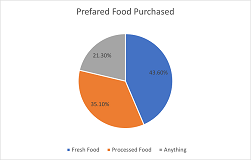Knowledge, Attitude and Practice toward Nutrition among Communities in Southern Senatorial Zone of Borno State

Abstract:
Nutrition is a key element
of health promotion, prevention, and management of diseases. The study was aimed
at assessing the nutritional knowledge, attitude, and practice of communities and
to determine factors influencing the nutritional knowledge, attitudes, and practices
of these communities. A cross-sectional study was conducted
among 10 communities. Multistage sampling was used to select the sample size of
1000 individuals. The study utilized both primary and secondary data through journals and administration
of a self-developed structured interviewer
questionnaire and focus group discussions. The data was analyzed using statistical
package for social science (SPSS v20). Results were presented using descriptive statistics and Chi-square. The findings of
the study revealed that communities have little or no knowledge about nutrition
despite the availability of different sources of nutritional information, majority
of communities have a negative attitude towards the importance of nutrition because
of their Cultural beliefs. Moreso, majority communities do not prepare balanced
family meals. The result from chi-square analysis shows that age and source of nutritional
knowledge are the main factors influencing nutritional knowledge and education level,
marital status, and sources of family income are the main factors influencing nutritional
practices among communities. Base on the findings of the study it was recommended
among others that there is need to increased public awareness and enlightenment to improve the
attitude and practice of communities, community
leaders and health workers to promote good dietary habits and consumption of good
indigenous food to motivate practice among communities.
References:
[1] World Health Organization (2019) World Health Statistics: monitoring
health for sustainable development goals: ISBN 978-92-4-156570-7.
[2] Givens D.I (2018) Dairy foods, red meat and processed meat in
the diet: implications for health at key life stages. Animal12, 1709– 1721. Cambridge
University Press.
[3] Triches, R. & Giugliani, E. (2005). Obesity, eating habits
and nutritional knowledge among school children. Revista de Saúde Pública.
39:541-547.
[4] Ihab, A., Jalil, R., Manan, W., Wan N., Wan S., Mohd S., Zalilah
& Abdullah, M. (2013). Nutritional Outcomes Related to Household Food Insecurity
among Mothers in Rural Malaysia. Journal of health, population, and nutrition.
31: 480-9.
[5] Mirmiran, P., Azadbakht, L., & Azizi F. (2007) Dietary behaviour
of Tehranian adolescents does not accord with their nutritional knowledge. Journal
Public Health Nutrition 10(9):897-901.
[6] Kigaru, D.M.D., Loechl, C., Moleah, T. (2015) Nutrition knowledge,
attitude and practices among urban primary school children in Nairobi City, Kenya:
a KAP study. BMC Nutrition 1(44). https://doi.org/10.1186/s40795-015-0040-8.
[7] Kalu, R.E and Etim, K.E (2018) Factors Associated with Malnutrition
among Underfive Children in Developing Countries: A Review. Global journal of
pure and applied sciences 24: 69-74 ISSN 1118-0579 DOI: https://dx.doi.org/10.4314/gjpas.v24i1.8.
[8] Berti C, Cetin I, and Agostoni C. (2016) Pregnancy and infants’
outcome: nutritional and metabolic implications. Crit Rev Food Science Nutrition.
56:82-91.
[9] Uddin M.T., Islam M.N. & Uddin MJ (2008) A survey on knowledge
of nutrition of physicians in Bangladesh: evidence from Sylhet data. South East
Asian Journal Medical Education. 2:14–17.
[10] Vahyala A.T., Minnessi G.K. and Kabiru U. (2016). The effects
of Boko Haram insurgency on food security status of some selected local government
areas in Adamawa State, Nigeria. Sky Journal of Food Science 5(3): 012 –
018.
[11] Nahikian-Nelms, M. (1997) Influential Factors of Caregiver Behavior
at Mealtime: A Study of 24 Child Care Programs. Journal of the American Dietetic
Association, (97), 505-509.
[12] Bakhtiar M.D., Masud-ur-Rahman M.D., Kamruzzaman Nargis Sultana
M.D and Shaikh S.S. (2021) Determinants of nutrition knowledge, attitude and practices
of adolescent sports trainee: A cross-sectional study in Bangladesh. Heliyon
Journal 7(1):1-11.
[13] Jeinie, M.H.B.; Guad, R.M.; Hetherington, M.M.; Gan, S.H.; Aung,
Y.N.; Seng,W.Y.; Lin, C.L.S.; George, R.; Sawatan,W.; Nor, N.M. (2021) Comparison
of Nutritional Knowledge, Attitudes and Practices between Urban and Rural Secondary
School Students: A Cross-Sectional Study in Sabah, East Malaysia. Foods. 10, 2037.
https://doi.org/10.3390/foods10092037.
[14] Fasola O, Abosede O, Fasola F.A. (2018). Knowledge, attitude and
practice of good nutrition among women of childbearing age in Somolu Local Government,
Lagos State. Journal Public Health African. 9(1):793.
[15] Charles S.R., Ismail S., Ahmad N., Ying L.P, Abubakar N.I. (2016)
Knowledge, Attitude, and Practice of Adolescent Girls towards Reducing Malnutrition
in Maiduguri Metropolitan Council, Borno State, Nigeria: Cross-Sectional Study.
Nutrients. ;12(6):1681.
[16] Likert, R. (1932). A technique for measurement of attitudes. Archives
of Psychology, 140, 5-55.
[17] Kassahun, C.W., Mekonen, A.G. (2017) Knowledge, attitude, practices
and their associated factors towards diabetes mellitus among non-diabetes community
members of Bale Zone administrative towns, South East. Journal of Medical Science
12(1):34-37.
[18] Uba, M. N., Alih, F. I., Kever, R.T. & Lola, N. (2015). Knowledge,
attitude and practice of nurses toward pressure ulcer prevention in University of
Maiduguri Teaching Hospital, Borno State, North-Eastern, Nigeria. International
Journal of Nursing and Midwifery, 7(4), 54-60.
[19] Kaur, K., Grover, K., & Kaur, N. (2016). Assessment of Nutrition
Knowledge of Rural Mothers and Its Effectiveness in Improving Nutritional Status
of Their Children. Indian Research Journal of Extension Education, 15, 90-98.
[20] Farjana R.B, Joti Lal B., Kazi Abul K. (2021) Knowledge, Attitude
and Practices Regarding Nutrition among Adolescent Girls in Dhaka City: A Cross-sectional
Study. Nutrition Food Science International Journal. 10(4): 555795. DOI:
10.19080/NFSIJ.2021.10.555795.
[21] Sulaiman S., Muhammad G.A, Muhammad A.S., Abubakar H., and Abubakar
S.M. (2020). Assessment of nutritional status, knowledge, attitude, and practices
of infant and young child feeding in Kumbotso local government area, Kano State,
Nigeria. Pakistan Journal Nutrition 19: 444-450.
[22] French, S. A., Wall, M., & Mitchell, N. R. (2010). Household
income differences in food sources and food items purchased. The international
journal of behavioral nutrition and physical activity, 7, 77. https://doi.org/10.1186/1479-5868-7-77.a.

